Considering a move overseas to the Land of The Morning Calm to work with EPIK, but not sure how to complete the EPIK application? Want to boost your chances of getting your EPIK application accepted, nail the online interview, and be 100% ready to move to Korea? Then this guide about how to apply for EPIK Korea has you covered.
The EPIK application process is a beast. I’ve been through it myself. That’s why I want to give you loads of my best tips about how to improve your chances of successfully applying for EPIK. I’ll show you what to include in your personal essay, lesson plan, and what to focus on in the interview.
This guide also covers details about who is eligible for EPIK, when you can apply (twice per year), what the minimum requirements are to get onto EPIK, and some of my own personal insights into the application process, living in Korea, and whether the EPIK Program is right for you. There really are so many reasons why you should apply for EPIK and change your life forever.
Affiliate Disclaimer: This site contains affiliate links and I may earn commission for purchases made after clicking these links.
In This How To Apply For EPIK Guide

In this guide I’ll cover the essentials for applying to EPIK, including details about:
- Who is eligible to apply for EPIK
- The requirements for joining EPIK
- Starting dates for EPIK each year
- When to submit your EPIK application form
- The whole EPIK application process
- Tips for nailing the EPIK application process
- Final thoughts about whether EPIK is right for you.
If you want to hear my own personal story about teaching with EPIK for 5 years, or what life is like as an EPIK teacher, check out my articles about My EPIK Life Teaching In Korea and my Review of the EPIK Teaching Experience.
What Is The EPIK Program?

Here’s a brief breakdown of the EPIK Program, including the history of EPIK, what EPIK employees do, and who is eligible to teach in Korea with EPIK.
The EPIK (English Program In Korea) Program was created in 1995 as a way to increase the English-speaking abilities of Korean students and teachers, as well as to develop cultural exchanges between Korea and the English-speaking world. Today, the EPIK Program has thousands of foreigners from seven native English-speaking countries teaching English in schools across Korea.
Teaching English in Korea with EPIK is a win-win situation for both the Korean students and for citizens from the eligible countries. The students get to listen to and interact with a native English speaker. The native English speaker gets to experience life in Korea, develop skills through working in Korea, and has the chance to save and travel lots.
Benefits of working on the EPIK Program
Here are some of the benefits you will receive as an EPIK teacher in Korea. These are open to everyone who works for EPIK, but how much you’ll get will depend on the region you teach in.
- Salary range of 2,000,000 – 2,700,000 KRW (plus overtime)
- 18 – 26 days paid vacation (plus national holidays)
- Free accommodation
- Flight allowance into and out of Korea
- Generous bonuses for renewing your contract
- 1 month severance pay each year
- Health insurance and pension
One of the biggest benefits to applying for EPIK over other jobs is the support you’ll receive and how you’re guided into living and working in Korea. You’ll be assigned a mentor who will help you adjust to life in Korea and other teachers at your school will help lots.
Read on to find out if you’re eligible to apply for EPIK.
Planning to visit Korea? These travel essentials will help you plan your trip, get the best deals, and save you time and money before and during your Korean adventure.
Visas & K-ETA: Some travellers to Korea need a Tourist Visa, but most can travel with a Korean Electronic Travel Authorisation (K-ETA). Currently 22 Countries don’t need either one.
How To Stay Connected: Pre-order a Korean Sim Card or a WiFi Router to collect on-arrival at Incheon Airport (desks open 24-hours). Alternatively, download a Korean eSIM for you travels.
Where To Stay: For Seoul, I recommend Myeongdong (convenient), Hongdae (cool culture) or Gangnam (shopping). For Busan, Haeundae (Beach) or Seomyeon (Downtown).
Incheon Airport To Seoul: Take the Airport Express (AREX) to Seoul Station or a Limo Bus across Seoul. Book an Incheon Airport Private Transfer and relax to or from the airport.
Korean Tour Operators: Tour companies that have a big presence in Korea include Klook, Trazy, Viator, and Get Your Guide. These sites offer discounted entry tickets for top attractions
Seoul City Passes: Visit Seoul’s top attractions for free with a Discover Seoul Pass or Go City Seoul Pass. These passes are great for families and couples visiting Seoul – you can save lots.
How To Get Around: For public transport, grab a T-Money Card. Save money on Korea’s high speed trains with a Korea Rail Pass. To see more of Korea, there are many Rental Car Options.
Travel Money: Use money exchanges near Myeongdong and Hongdae subway stations for the best exchange rates. Order a Wise Card or WOWPASS to pay by card across Korea.
Flights To Korea: I use flight comparison sites such as Expedia and Skyscanner to find the best flights to Korea from any country. Air Asia is a good option for budget flights from Asia.
How To Learn Korean: The language course from 90 Day Korean or Korean Class 101 both have well-structured lessons and lots of useful resources to help you learn Korean.
Who Can Apply For EPIK Korea?

To maintain a high level of candidates and to provide the most authentic language learning experience for Korean students, entry to EPIK is quite restricted. This also applies to other English teaching jobs in Korea. Here’s some FAQs covering who can apply for EPIK.
What countries are eligible to apply for EPIK?
Citizens from the following countries can apply for EPIK.
- United States
- United Kingdom
- Australia
- New Zealand
- South Africa
- Canada
- Ireland
*Under the CEPA agreement, citizens from India can also apply as long as they meet all other requirements and hold a teacher’s license in English. Contact epik@korea.kr for more information.
Do I Need A Degree To Apply For EPIK?
Yes, you need to have at least a Bachelor’s degree from a university in one of the 7 countries listed above. The Bachelor’s degree must be from an accredited university and taught in English.
You’ll also need to have studied in English since 7th grade.
Is A Degree All I Need To Apply For EPIK?
You won’t need any other qualifications to apply for EPIK if your Bachelor’s degree is in Education with one of the following majors:
- Education
- Teaching
- TESOL
- Second Language Studies
However, if your Bachelor’s degree is in any other subject, you’ll also need one of these to apply:
- A TEFL / TESOL / CELTA certificate
- A teacher’s license
- 1 year experience on the TaLK Program.
The TaLK Program was a teaching program by the Korean government aimed at current Bachelor’s students who want to experience life working and living in Korea. Sadly, the TaLK Program ended in August 2021 after 13 years.
When To Apply For EPIK Korea

There are two EPIK intakes each year in spring and fall. You’ll need to start your EPIK application up to 6 months before you want to start working on EPIK. For university graduates in countries such as the USA or UK, who finish in the summer, the fall intake is very convenient.
Here are some key dates for the two intakes. Remember, the earlier you start the application, the more likely you are to be accepted for the EPIK Program, especially if you apply directly to EPIK.
When To Apply For EPIK Spring 2025 Intake
These are the dates provided by EPIK for the spring intake. You can start your application from August onwards.
- Submit Application form – Aug – Nov
- Skype Interview – Oct – Jan
- Submit Documents – Oct – Jan
- Receive Confirmation – Oct – Jan
- Apply For Korean Visa – Jan – Feb
- Book Flight To Korea – Jan – Feb
- Start With EPIK Program – late Feb
The actual start date is usually around the 26th of February each year. You may be required to arrive in Korea up to 1 week before that start date for an orientation. There are also late spring intake positions in March or April. The application for EPIK Spring 2025 will begin in August 2025.
Please note: The application period for the EPIK Spring 2025 intake will end in November. I recommend submitting your application form and preparing your documents as soon as possible to avoid delays and to ensure you’re successful.
When To Apply For EPIK Fall 2025 Intake
The dates for the fall intake are the same as the spring intake, but 6 months later. Here are the dates for the EPIK fall 2025 intake.
- Submit Application Form – Feb – May
- Skype Interview – Apr – Jul
- Submit Documents – Apr – Jul
- Receive Confirmation – Apr – Jul
- Apply For Korean Visa – Jul – Aug
- Book Flight To Korea – Jul – Aug
- Start With EPIK Program – late Aug
The actual start date is around the 26th of August each year. You may be required to arrive in Korea up to 1 week before that start date for an orientation. There are also late fall intake positions in September or October.
Applications for EPIK Fall 2025 intake will begin in mid-February, 2025.
If you’re worried about applying whilst still at university, EPIK understands that it takes longer to receive these documents and will accept a letter from your university with your expected graduation.
How Long Do EPIK Contracts Last?
EPIK contracts run for 12 months from around the 26th of February or August each year until the following year. During the 12 months, you’ll be given the opportunity to apply to re-contract for another 12 months. This way you can work with EPIK for multiple years. This is dependent on passing your evaluation and being accepted for re-contract.
How Long Can I Teach With EPIK?
There is no written limit to how many times you can re-contract with EPIK. I taught with EPIK for 5 years and therefore re-contracted 4 more times past my original 1 year contract. I know people who have worked on EPIK for longer than that.
Re-contracting is all dependent on the school’s desire to keep you and on your ability and effort to teach well. You’re never guaranteed to be re-contracted, but you have a better chance if you work hard and try to fit in.
Different Ways To Apply For EPIK

There are three different ways to apply for EPIK. These are:
- Apply directly to EPIK
- Apply through a recruiting agency
- Apply through an MOU/MOA organisation
The method you choose shouldn’t affect your chances of being accepted to EPIK, but will affect who handles your documents and contacts you about being placed with EPIK. Here’s a quick look at the 3 different methods and how they differ.
1: Applying Directly To EPIK
The direct method places all responsibility on you, but is also the fastest method of applying. I applied directly to EPIK and was placed much more quickly than others who went through an agency or organisation. That doesn’t mean you’re guaranteed to get a place, but you can find out one way or another more quickly.
Below is the process flow for applying directly to EPIK.
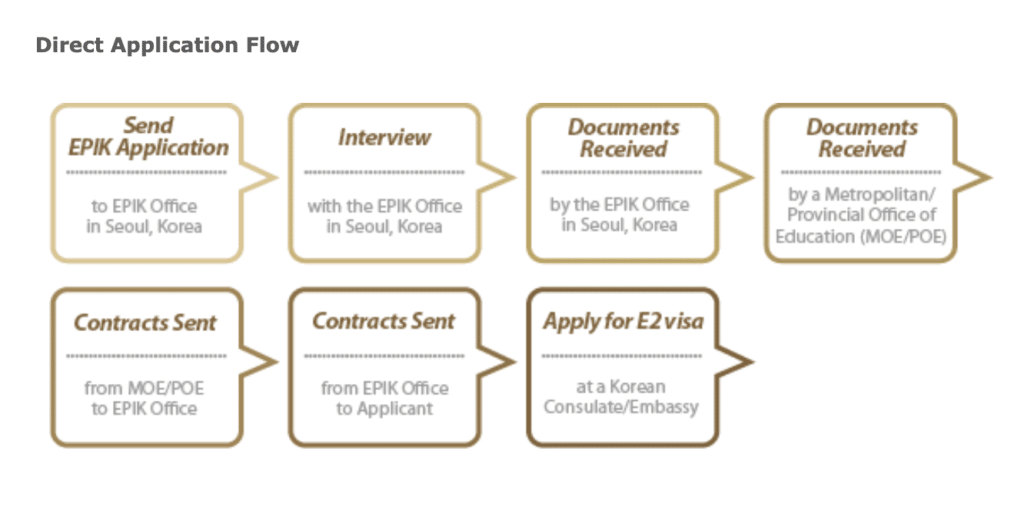
To apply for EPIK directly through their website, visit the EPIK website.
2: Applying Through A Recruiting Agency
The process of applying for EPIK through a recruiting agency is mostly the same as applying direct to EPIK. However, the benefit of using one of the official recruiting agencies is that they’ll help you complete your application, make sure you have the correct documents, and can provide lots of useful tips to make your EPIK application successful.
Furthermore, some of the big recruiting agencies, especially ones based in Korea such as Korvia, tend to have a community of EPIK teachers that are connected through the agency even after they arrive. If you’re looking for help, support, and a network of other teachers, then I would recommend you apply for EPIK through a recruiting agency. It’s also free!
Below is the process flow for applying for EPIK through a recruiting agency:
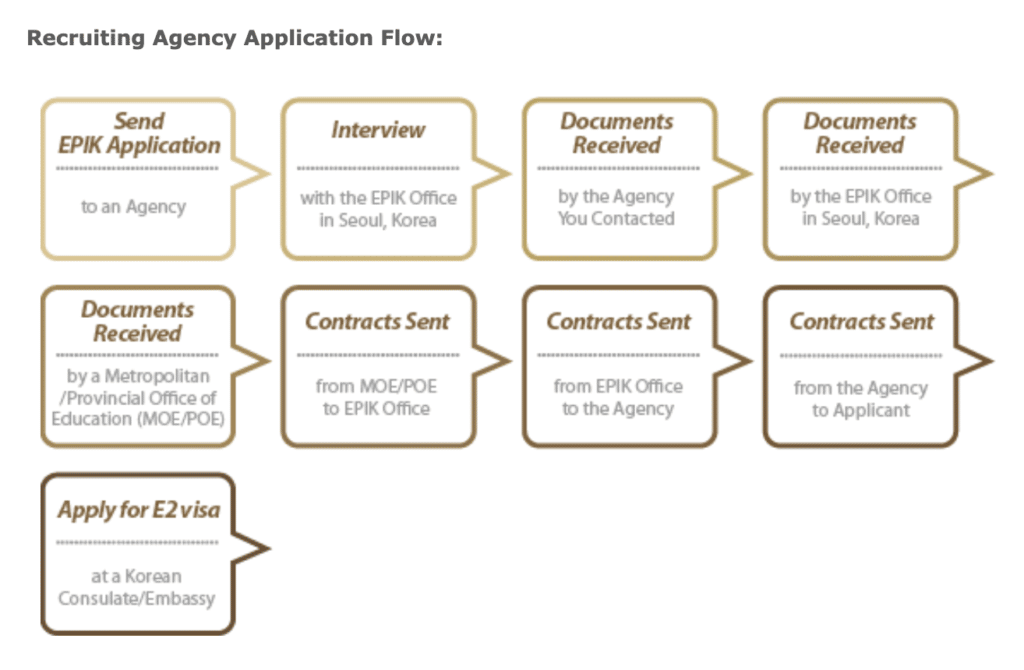
You can only apply for EPIK through a limited number of approved recruiting agencies in certain countries. Here’s the full list of recruiting agencies currently working with EPIK:
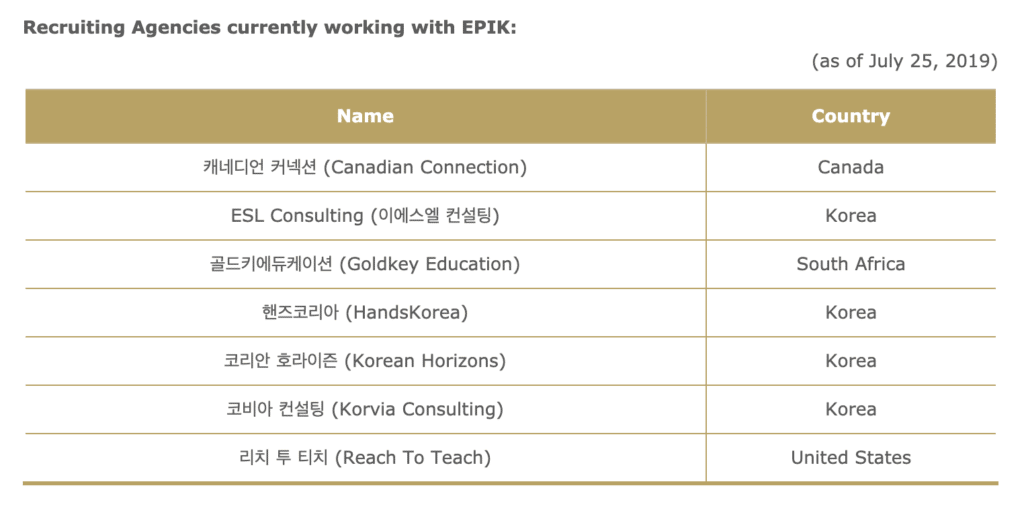
I haven’t had any experience with these agencies myself, but I’ve heard lots of good things about Korvia. Do your own research before choosing a recruiting agency to find one that will best fit your needs.
3: Applying Through MOU/MOA Organisation
The process of applying for EPIK through a Memorandum of Understanding (MOU) or a Memorandum of Agreement (MOA) organisation is similar to applying through a recruiting agency. The MOU/MOA will check your documents before sending them to EPIK and help you with your application.
Below is the process flow for applying for EPIK through an MOU/MOA organisation:
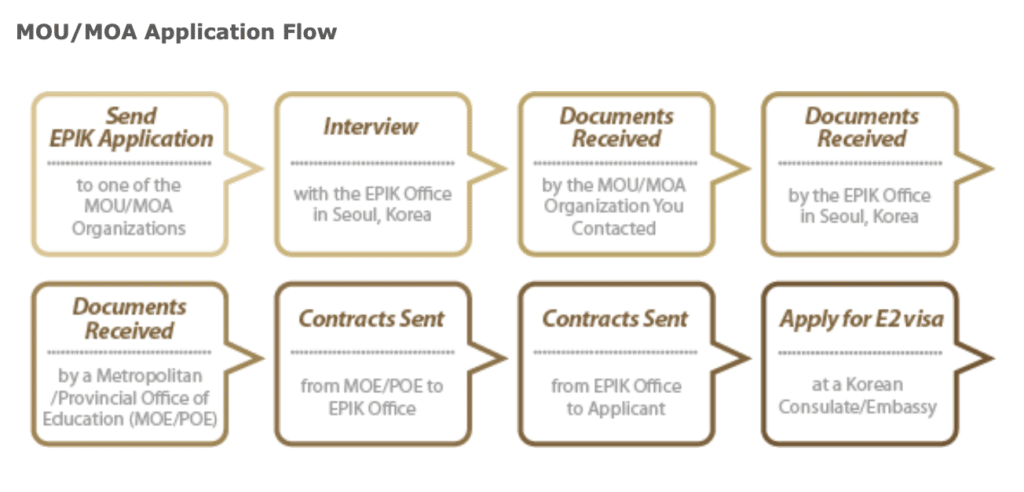
Unlike the recruiting agencies, the MOU/MOA organisations are all based overseas in the USA, UK, or Canada. Here’s the list of approved MOU/MOA organisations currently working with EPIK:
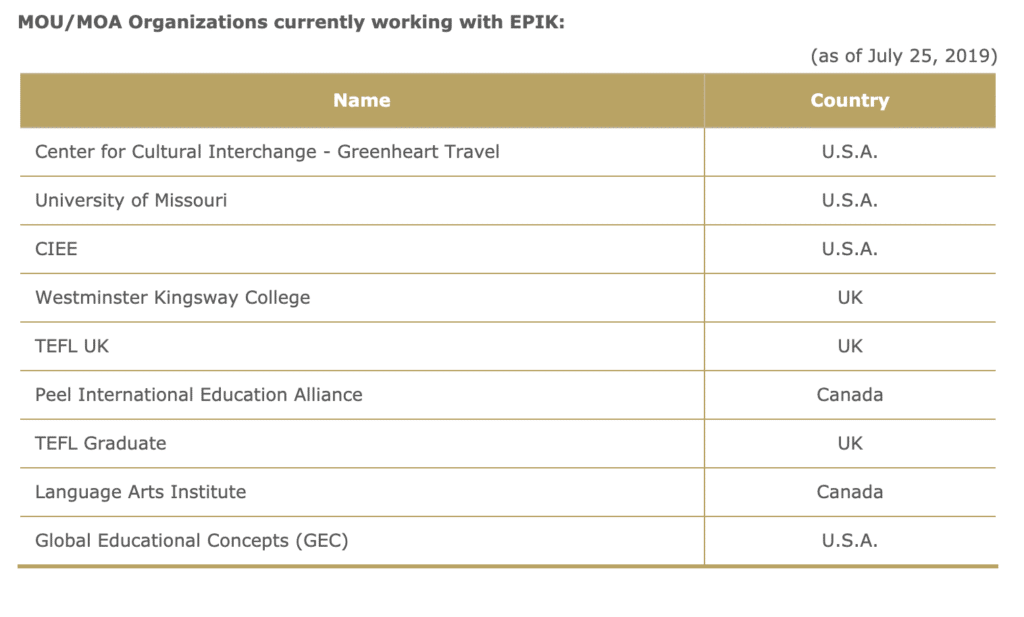
If you’ve studied or worked with one of these organisations, you might find it more convenient to apply through one of these organisations.
Whichever method you choose, remember that deadlines are quite rigid and it’s best to be as organised as possible to avoid problems.
What Is The EPIK Application Process?

The entire EPIK application process is a 6-month long journey that has number of crucial steps, interviews, deadlines, and things to watch out for. Navigating the whole process doesn’t have to be a headache, though.
The deadlines have already been covered, so this section will give you some tips about the following parts of your EPIK application process:
- How to complete the EPIK application form
- How to pass the EPIK Skype interview
- Which documents you need
- How to apply for your Korean visa
I won’t cover details about the flights, orientation, and life in Korea once you’ve been accepted. If you want to know more about those, be sure to read my post about Teaching English with EPIK.
Read on to find out all you need to know about the EPIK application form.
How To Complete The EPIK Application Form
The first and most crucial step on the road to EPIK is the application form. If this isn’t completed correctly, you’ll never get to the other stages. Not to worry, though. The EPIK application form isn’t that hard. Here’s some advice from EPIK about completing the application form:
“Before starting your application, please read through the the Initial Application Preparation Guide. This will give you details on what you need to prepare before starting your application on the online system.”
Take some time to read through this thoroughly. Most of the requirements will be fairly standard, such as your personal information, education history, and employment history.
The tricky parts are:
Sample lesson plan
You’ll need to provide a sample lesson plan to show that you have some idea about what’s involved in teaching. This doesn’t need to be too detailed, but try to include a few activities, a grammar or vocabulary focus, and some details about what you’ll do in the lesson.
Here are some Example Lesson Plans And Tips.
Personal essay
This essay should include details about your working attitude and personal life, as well as why you want to be a teacher in Korea. It may be broken down into sections, or you may be asked to provide one long essay covering all of this (depending on whether you’re applying for EPIK or GEPIK).
Try to focus on positives, mentioning how excited you are to experience Korean culture and teach small children. Korea is a country that values workplace harmony very highly, so try to convey that you work well with others and that you are diplomatic when problems arise. Needless to say correct grammar and spelling are essential.
Here are some more Personal Essay Tips.
How To Pass The EPIK Skype Interview

If you successfully pass the first stage of the EPIK application, you’ll be required to have an online interview with the EPIK office in Korea.
This is usually done through Skype. The interview lasts about 20 – 30 minutes and is your small window to show how enthusiastic and excited you are about working in Korea with EPIK. Make sure you use that time as best you can.
I won’t go over the questions they might ask, as they can change frequently. However, here are some tips to help you ace the EPIK Skype interview (and other interviews):
- Dress smartly
- Find a quiet place for the interview
- Check your internet connection is stable
- Keep your computer or laptop plugged in
- Prepare a glass of water to stay hydrated
- Read through your application form again
- Sit up straight and smile at the interviewer
- Keep control of your hands if nervous
- Breathe slowly to control nerves
- Show your passion for Korea lots
- Tell them why you’re perfect for the role
- Be positive at all times
- Be honest and don’t oversell yourself
If you’ve prepared all this before the interview, and stayed calm and professional during the interview, you’ll do fine. Your interviewer will have read your application form, so make sure you know what you wrote and try to include extra information that shows why you’re good for EPIK.
Some of the traits that make a good teacher are:
- Enthusiasm
- Positivity
- Tolerance
- Patience
- A sense of fun
Try to demonstrate these traits during the interview and you’ll ace it.
Which Documents Do You Need To Apply For EPIK?
If your application to EPIK is successful, and you pass the Skype interview stage, you will need to submit your documents to the relevant organisation ASAP. I would recommend preparing some of these before the Skype interview to avoid lengthy delays.
Some of these documents can be hard to get (especially the criminal record check) and may take weeks to sort out. If you’re applying for EPIK through the EPIK office, they assign positions on a first come, first placed basis, so get. in there quickly.
Here are the Official Documents You Need to apply for EPIK:
- Passport
- Professional photo
- Apostilled criminal record check
- Apostilled degree certificate / diploma
- Sealed transcripts
- Two original recommendation letters
- Proof of level 2 pay status
There are also a list of other documents that are country specific, such as an apostilled birth certificate (UK / Australian citizens) or proof of English education (South African / Quebecois).
Getting these documents can be a struggle and expensive. Try to work out where you can get your documents apostilled when you are writing your application form. And be prepared to spend several hundred dollars for it.
How To Apply For Your Korean Visa
Once you’ve been accepted onto the EPIK Program, you’ll be issued with your notice of appointment and contract to confirm that you have a job waiting for you in Korea. Now it’s time to get your Korean working visa.
The visa you need for EPIK is an E-2 Visa.
You can apply for these at your nearest Korean Embassy or Consulate Office. To apply for the E-2 visa you’ll need these documents:
- Passport
- Passport photo
- Employment contract
- Notice of appointment
- E-2 visa application form
The E-2 visa application form can be found on the Korean Embassy website. Download it and fill in your personal details, work and education history, and what you’ll be doing in Korea (working)
The visa approval process can take up to a week. Be sure to apply for the visa ASAP once you’ve received the documents from EPIK.
Once you’re all sorted with your application and accepted, be sure to check out these tips for moving to Korea to help you work out what to bring, how to make a good first impression, how to deal with culture shock, and also how to survive your first work party.
Final Thoughts: Is EPIK Right For You?

I really enjoyed teaching with EPIK. It was an incredible opportunity for me to develop my skills as a teacher, to save lots of money, to travel in and beyond Korea, and most of all develop a love and understanding of Korea and Korean culture.
But is EPIK and Korea right for you?
Getting out of your comfort zone can be incredibly hard. Moving to a new country and adapting to a different culture can be one of the hardest things you might experience in life, especially if you’re coming fresh from university.
Traits of people who are likely to succeed on EPIK include:
- Those who enjoy teaching and sharing knowledge
- Those open to new cultures and experiences
- Those who like trying new things
- Those willing to work hard
- Those who can be patient, tolerant, and won’t panic
- Those willing to take a chance
You don’t have to be extroverted to be a teacher. I’m certainly not. Nor do you have to know everything about Korea and be into K-pop (again, I’m not). The most important thing is being willing to try and try again if you fail first time.
10 Reasons To Apply For EPIK
Here’s a few insights into why I think you should apply for EPIK. These are things that drove me to renew my contract many times over and kept me in Korea to this day.
- This is a fantastic opportunity that will help you develop as a person and will teach you some important personal and life lessons.
- You will develop a greater understanding of foreign cultures, which will certainly help you be more aware of global issues and a more tolerant person. In an increasingly globalised world, this could help with further job opportunities.
- You can eat as much delicious Korean food as you want, all day, every day!
- It’s a great opportunity to save some money, lots of money!
- There are so many incredible countries to travel to during holiday time – Japan, China, Taiwan, SE Asia, etc.
- You can improve or develop your skills as a teacher. If you want to continue teaching in Korea or elsewhere, this is really a great place to start.
- Helping students learn English is rewarding in itself. Seeing them develop over 1 year, or more, is certainly worth the effort you put in.
- Fans of Korea will be able to see what life in Korea is really like. Teaching English with EPIK is a great way to establish yourself in Korea if you want to live there long-term.
- Life is short – this is a chance to seize an opportunity not gifted to most of the world. Make the most of it and get out of your comfort zone. You won’t regret it.
- Because you might end up meeting the person of your dreams…
More about Teaching In Korea

If you want to know more about teaching English in Korea with EPIK, I’d recommend some of my other articles about EPIK, including my review of the EPIK Teaching Experience and My Epik Life – 5 Years Teaching In Korea With EPIK. You can also get lots of really useful information from The Official EPIK Website and Korvia – A Korean recruiting agency for EPIK.
Feel free to leave a comment below if you still need answers and I’ll get back to you ASAP.
How To Apply For EPIK Korea FAQs
Finally, here’s a few FAQs about teaching English in Korea with EPIK, in case the above information didn’t cover enough for you.
Will recruiting agencies help me apply for EPIK Korea?
Yes. If you apply for EPIK through a recruiting agency they will help you perfect your application form and make sure there are no mistakes before submitting it. They can also provide you with example lesson plans and personal essays to give you inspiration for your own.
Can you teach English in Korea without a degree?
No. You can’t apply to work with EPIK unless you have at least a Bachelor’s degree. For all teaching jobs in Korea you’ll need a degree to be able to apply for the relevant work visa. Without a degree, you can’t teach in Korea. To start teaching English in Korea, you’ll also need at least a 100 hour TEFL certificate
Do I need to know Korean to apply for EPIK?
No, you don’t need to know Korean to apply for EPIK. However, your life in Korea will certainly be a bit easier if you know at least a few Korean phrases before you arrive. There are many great opportunities to learn Korean, both in Korea and online. When you’re teaching English in Korea, you’ll mostly be responsible for communicating with students in English as a native speaker. You won’t need to translate English into Korea, or vice-versa.
What school would I work at with EPIK?
Most EPIK teachers work at an elementary school. If you start teaching English in Korea with EPIK then you are most likely to be placed at an elementary school, middle school, high school, or special institute – in that order. High school positions with EPIK are quite rare and most people work at an elementary or middle school. You won’t find out which school you’re going to be working at until you arrive in Korea.
Where would I be teaching with EPIK?
There is no definite answer, but if you request to work in a certain area, then you may be placed there. For those people interested in teaching English in Seoul, then you should apply to work for the Seoul Metropolitan Office of Education (SMOE), otherwise you could be placed anywhere in Korea. You could teach in a large city, but there are also rural places available, too. You won’t have a choice and you’ll find out when you start teaching. Whatever place you are given, make the most of it.
How long can I work with EPIK?
There is no maximum amount of time. The minimum time you can work with EPIK is 1 year. Each year you’ll have to pass a review that will allow you to extend your contract by 1 year. Most people stay for 1 or 2 years, but it is possible to work for longer. I’ve been teaching English in Korea with EPIK for 5 years and I know others who have been with EPIK for longer than that.
Who can apply for EPIK?
Only people from the recognised 7 native English-speaking countries can apply to teach English in Korea with EPIK. These 7 native English-speaking countries are the USA, UK, Australia, New Zealand, Canada, Ireland, and South Africa. You have to be a native English speaker and have studied in English at school.
When do EPIK teaching jobs start?
February and August. There are two intakes each year – the spring intake and autumn/fall intake. Application for these intakes begin around 6 months before the start date. Therefore, if you want to begin during the autumn intake, you’ll need to start your EPIK application in February. For the spring intake, begin applying in August.
How much do you make teaching with EPIK?
The minimum amount of money you’ll earn per month teaching English in Korea with EPIK is 2,000,000 Korean won. You can earn more if you have a Master’s degree or teaching experience. You’ll also get lots of other benefits, including free accommodation, severance pay after each yearly contract, flight allowance, 26 days paid vacation each year, and a settlement allowance.
Does EPIK pay for the flight to Korea?
Yes. Your flight to Korea will be reimbursed once you arrive and start teaching. However, you will need to pay for your flight originally. It can take up to a month after you start teaching to receive this refund.
Liked This? Pin It For Others
If you enjoyed reading this article, then please share this with your friends on Pinterest.
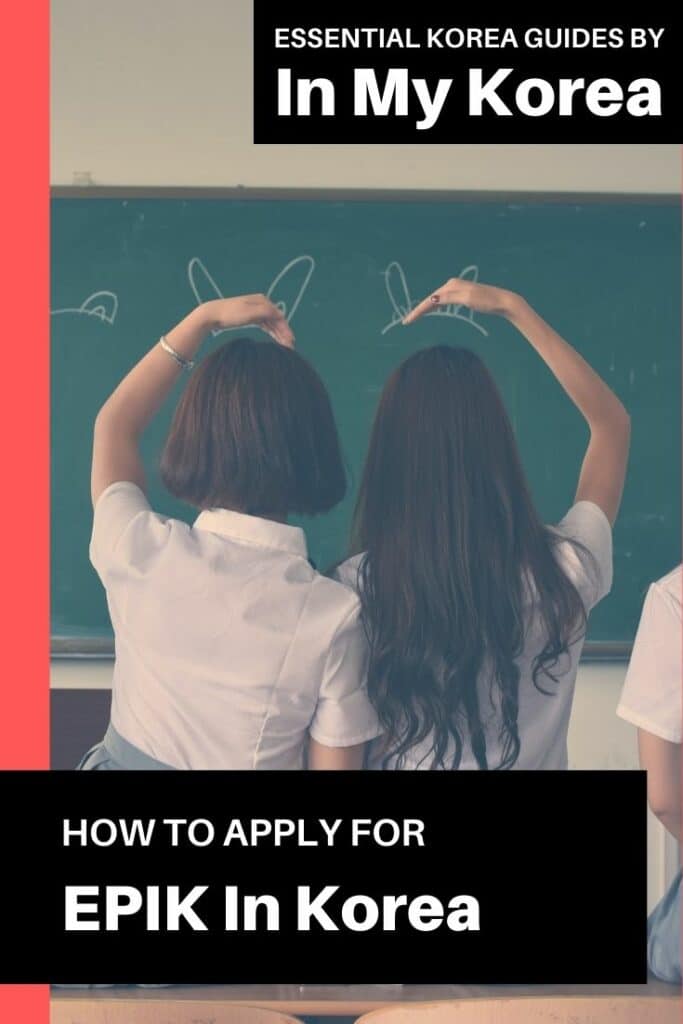
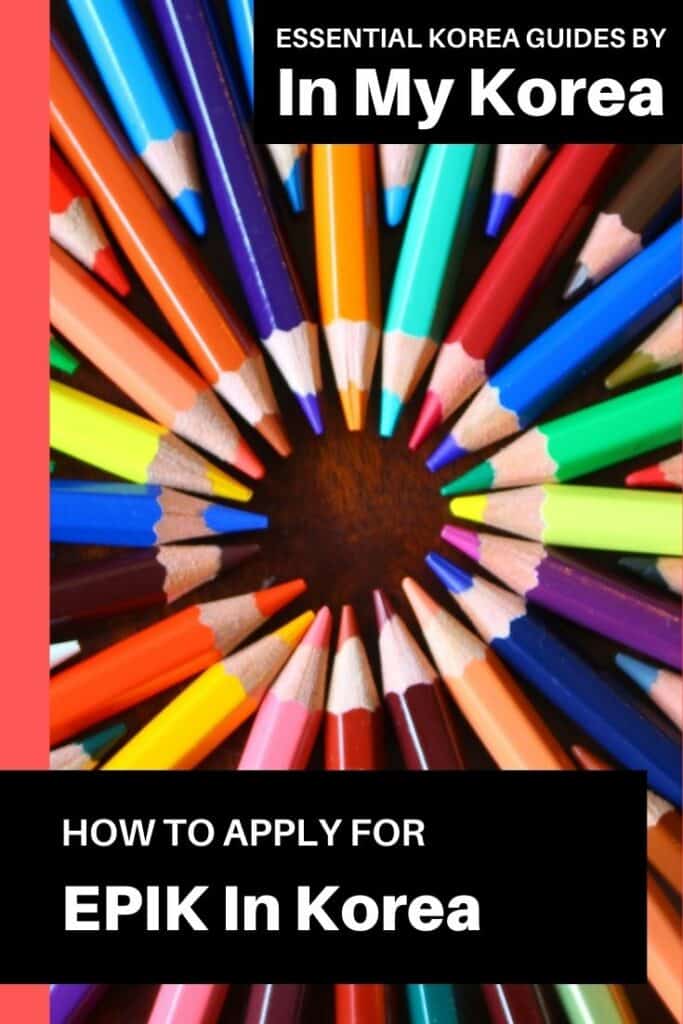
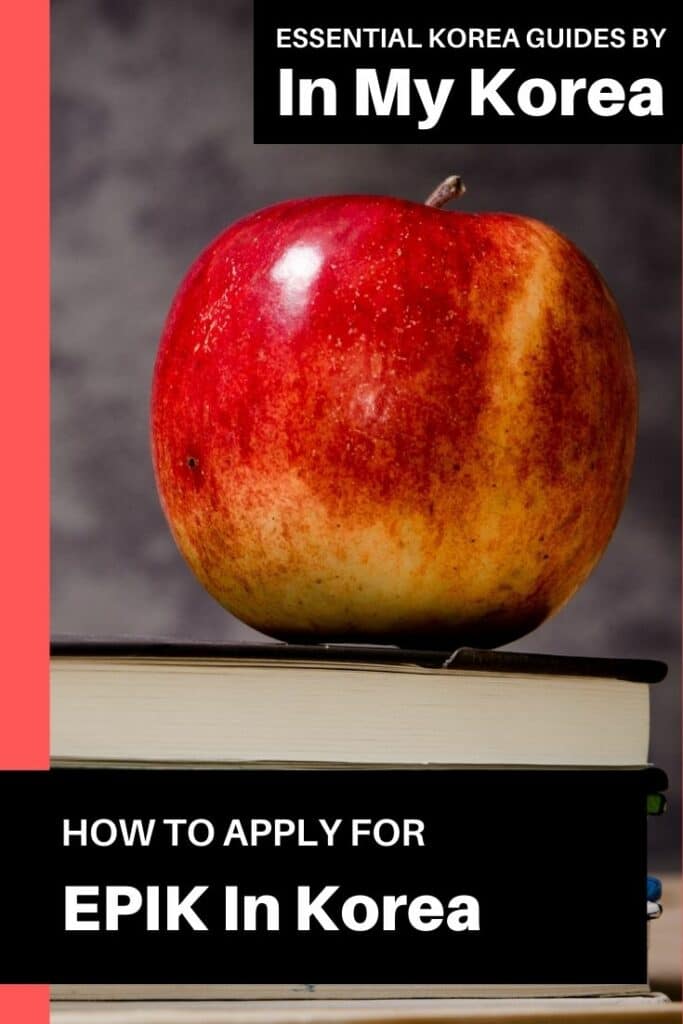



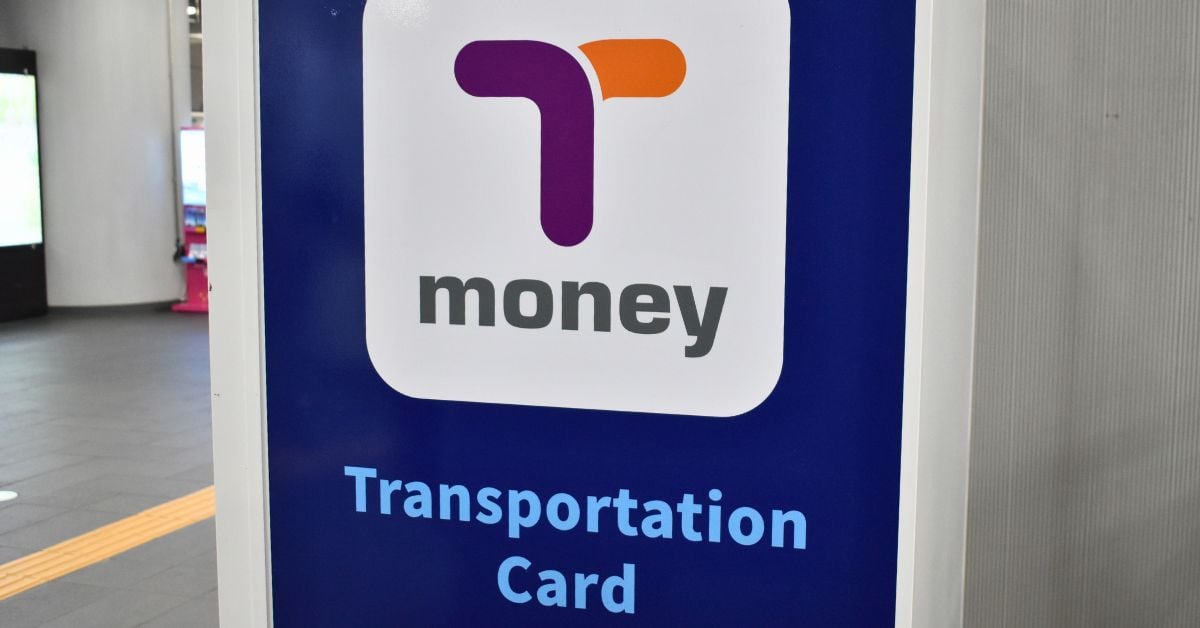


I have done ESL this past year and it really solidified my decision to teach English in Korea. I have my bachelor’s and I’m in the education program currently, I want to apply for the SMOE program which is for Seoul specifically. Do these programs allow you to apply while in the process of that? I also plan to take my TELF program within the next month.
Thank you so much for your time!
Hi, thanks for reading. Yes, you can apply for the autumn intake of EPIK if you’re scheduled to graduate before the intake begins (i.e. finish your course by June / July). As long as you can get your documentation in time to get the visa ready, which should be fine, they’re happy to accept soon-to-be graduates.